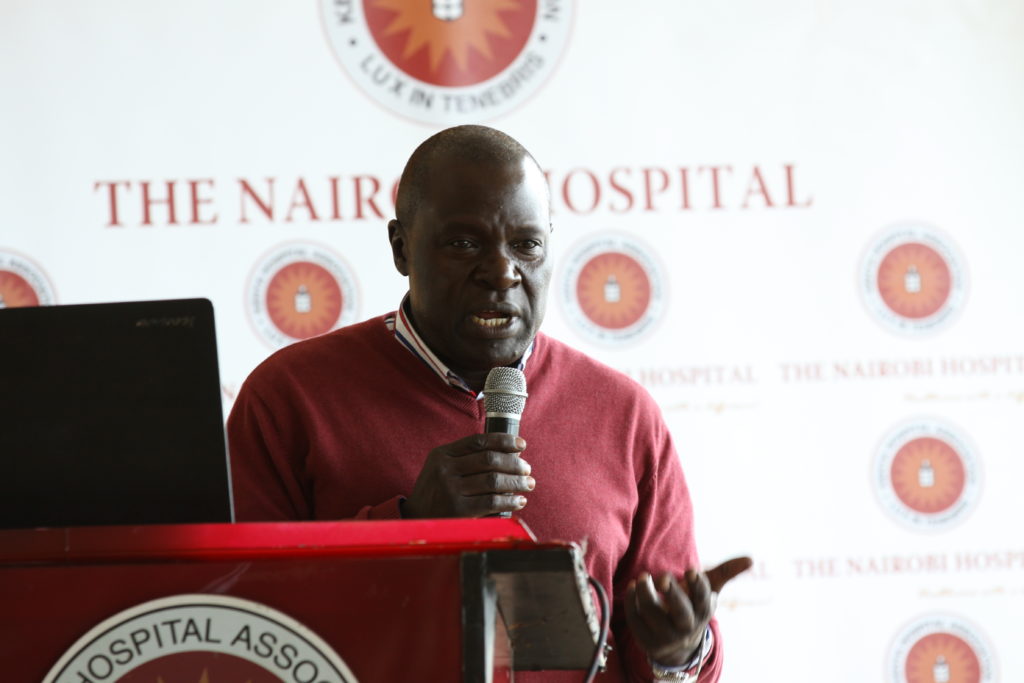By Clifford Akumu
Women with an advanced maternal age tend to develop potentially lethal complications during pregnancy ranging from restricted foetal growth, congenital abnormalities and hypertension, a situation that puts them at risk while giving birth.
Although advanced maternal age was pegged at 35years, obstetricians are now alive to the new opinion that puts the age at 40 years fueling a new ‘pre-conception care thinking’ among healthcare provision centers.
Prof. Omondi Ogutu, Chairman Department of Obstetrics and Gynecology University of Nairobi alludes that women at this age are very critical and ‘need early screening and monitoring all the way’ to reduce maternal mortality.

Ogutu insists that access to quality healthcare for Kenyan women should be a major concern to all parties involved in the provision of healthcare.
“Many complications in pregnancy tend to occur during advanced maternal age. We have to care for these women more aggressively by screening and correcting them at an early stage so that the outcome we get is a good baby and a good mother”
But lack of data on the prevalence of advanced maternal age among women in the country is choking up systemic care among this population.
Kenya Health Demographic Survey of 2014 puts mothers who deliver at an advanced maternal age at 10%, a situation Prof. Omondi terms as ‘not comprehensive figure’ since it samples the population.
He believes this number could go up with proper systems in place to collate the data from all the healthcare provisions in the country.

“A recent study done by Kenyatta National Hospital recorded a prevalence rate of 12.6% which is within the same range as KHDS.The question of getting good data could be because of two things inability to collate all the information available and clean the data we already have .” Said Omondi
Major healthcare provision centers require homegrown training on maternal fetal medicine to be able to nip in the bud professional brain drain.
According to Ogutu, his department is developing an ambitious fellowship program for on maternal fetal medicine to fill the professional gap.
The training program will take two years for people who have already gone through formal trainings as obstetrician and gynecologist and have attained master’s degree
Most of these trainings are usually offered abroad, he says that, homegrown solutions will a harbinger to a professional pool of specialist to care for our older women
“We are already at the planning stages; I cannot promise when it is going to start, but I am sure the next one or two years it should be functional” Ogutu said on the sidelines of Reproductive Health Symposium at Nairobi Hospital.
The nation, he said, would make significant strides in the health sector if they gave healthcare providers a lead in decision making. Devolved healthcare would present the best bet, he said.
“I can tell you today that the government has done a lot .But, we still have a long way to go in achieving an optimum healthcare for our women”
“Probably this is the time whereby the healthcare providers should be incorporated at the point of decision making at the county level so that they have a voice in what they really require, their priorities to be able to provide adequate service for the Kenyan population.” Noted Dr.Ogutu.
Improved infrastructure in all the health institutions, adequate and well trained personnel, well remunerated and working environment are some of the prerequisite for a universal healthcare provision.
Dr.Khama Rogo, head of the World Bank Group’s Health in Africa Initiative called on healthcare providers to take lead in protecting women through strong partnerships.
“Healthcare provision needs strong partnerships with like-minded investors. We do not need to only rely on the assistance from the government to achieve the agenda.” Noted Dr.Rogo
With a maternal mortality rate of 488 deaths per 100,000 live births, the country is off track in achieving the UN’s Sustainable Development Goal numbers four and five by 2015.
Kenya had committed to reduce these deaths to 147 per 100,000 live births by 2015.














